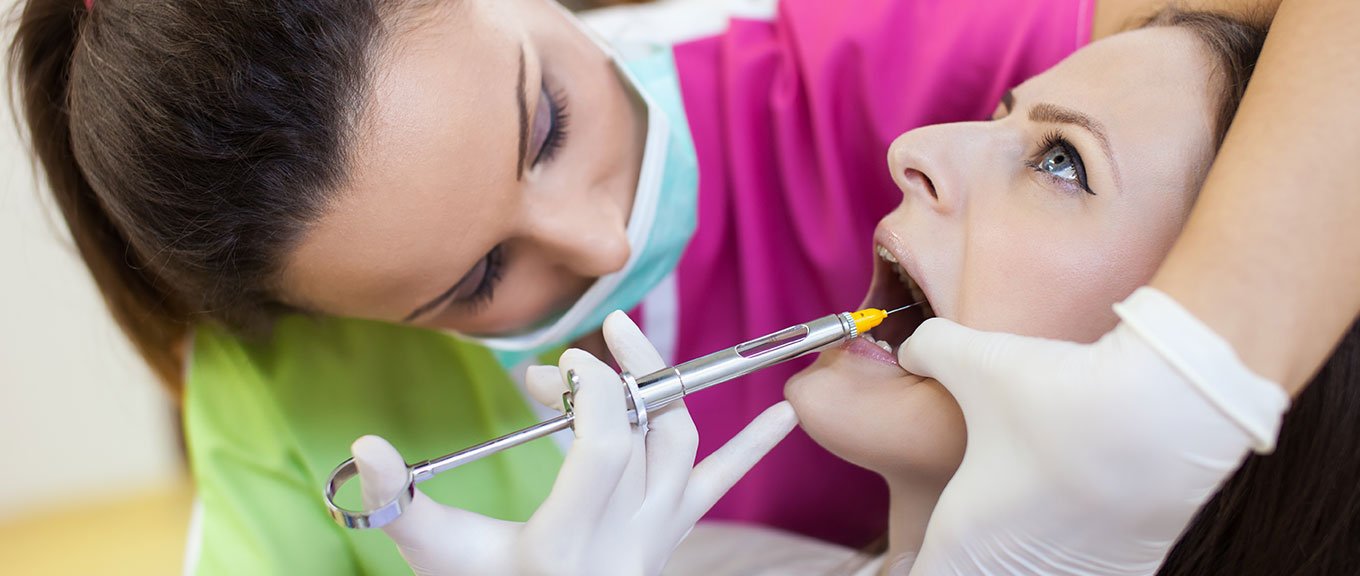
Painless Dentistry: Oral Sedation vs. Local Anesthesia

Posted On: May 22, 2023 by Dr. Saro Babian
Are you afraid of dentists or dental treatment? Do you wish you could experience painless dentistry? If so, you’re not alone. Millions of people share your anxiety.
According to the Cleveland Clinic, about 36% of people in the U.S. fear dental treatment. About 12% suffer from extreme fear and may avoid going to the dentist at all.
This type of fear is so prevalent, it has multiple names. Dentophobia and odontophobia are the most common. Dentophobia is an anxiety-phobic disorder recognized by the American Psychiatric Association. Dentophobics often have extreme anxiety over the thought of going to the dentist or reclining in a dentist’s chair. They may experience chills, dizziness, excessive sweating, heart palpitations, nausea, upset stomach, and shortness of breath. Some people are so frightened they can’t sleep the night before dental appointments.
Some dentophobics avoid dental treatment for years at the cost of their oral health. But it doesn’t have to be that way. There are effective, painless solutions to your problem. In this article, we’ll explore the specific fears and causes, as well as the solutions, including oral sedation dentistry.
What Are You Afraid Of?
If you suffer from dentophobia, you may be afraid of:
Anesthetic: You may fear the needle, the anesthetic not working, or side effects such as temporary numbness of your lips.
Blood: Some people fear blood (hemophobia) and may panic about the minor bleeding that can occur during some dental procedures.
Choking: Some people fear gagging while their mouth is numb from the anesthetic. They fear being unable to breathe or swallow.
Dentist: Many people associate negative feelings with dentists, especially if they’ve had bad experiences with dentists in the past.
Pain: Some dental procedures involve a small amount of pain during or after. Some people are more sensitive to pain than others.
Needles: Some people fear needles and may fear the injections dentists use during dental procedures.
Noise: Some people fear the noises made by drills and other dental instruments used by a dentist or dental hygienist.
Odors: Some people become anxious about how the dentist’s office smells or the aromas common in dental treatment.
What Causes Dentophobia?
Dentophobia has several possible causes. These include:
Embarrassment: You may feel worried about how your teeth look or how your breath smells.
Family History: Your risk of dental phobia increases if you have a parent or family member with a phobic disorder or anxiety disorder.
Helplessness: Lying in a dental chair with your mouth open for an extended period can make you feel a loss of control.
Traumatic History: If you have a history of abuse, child abuse, being bullied in school, or sexual abuse, you may have an increased risk of dentophobia.
Experience: People who’ve had negative traumatic experiences with dentists often develop dentophobia. These may include negative dental experiences from childhood or procedures that caused pain or complications.
Oral Sedation Dentistry vs. Anesthesia
If you’re looking for a painless dentistry experience, you should know that most dentists offer you a choice between local anesthetic numbing or oral sedation dentistry. You should understand the differences before you choose.
Both sedation and anesthesia can ease your anxiety and prevent pain. They can make you feel drowsy, reduce your coordination, and affect your ability to remember the procedure. In many cases, it’s best to have a family member or friend accompany you to the dental office if you are undergoing sedation or local anesthesia. Despite their similarities, sedation and anesthesia are not the same.
Local Anesthesia
Local anesthesia uses injections of medication such as lidocaine through a needle. In some cases, your dentist may apply a cream to numb a small area of your mouth. For most patients without dental phobias, local anesthesia alone may provide enough pain relief for limited procedures such as dental cleaning, drilling, and filling dental cavities. Within a few minutes of the injection, your mouth will feel numb enough to eliminate any pain.
Oral Sedation
Your dentist can provide sedation medication to help you relax during treatments. Medications may include nitrous oxide, pills you take orally, or IV sedation, which the dentist administers through a vein in your arm.
When you are under sedation, you’ll feel relaxed and may fall into a light sleep. Many dentists refer to this as conscious oral sedation because you remain awake but in a state of diminished alertness. You can breathe and respond to verbal or physical cues. The dentist delivers this type of sedation through a face mask using nitrous oxide, also known as laughing gas, or with an oral pill or injection.
There are different levels of sedation depending on the type of dental procedure and your preference. Under mild sedation, you’re awake and can respond to questions or instructions. With moderate sedation, you may doze off but awaken easily.
To help you choose between sedation or anesthesia, your dentist will explain your options and make a recommendation. Your dentist may recommend either option if you need a wisdom tooth extraction or a dental implant procedure.
According to the Annals of Maxillofacial Surgery, conscious sedation can help patients with dentophobia, patients who have medical conditions aggravated by stress, such as asthma or epilepsy, and patients who undergo more extensive procedures. Mentally challenged patients and children older than one year can also receive conscious sedation.
What Are the Risks?
While dental experts consider sedation and anesthesia safe, you should know that any medical procedure comes with certain risks.
For example, an article in the Annals of Maxillofacial Surgery says conscious sedation may pose a risk if a child has large tonsils that make them more vulnerable to airway obstructions. Some patients may experience heart arrhythmias or lose consciousness during certain procedures.
Remember that your dental team is trained to monitor your vital signs and your needs throughout your procedure. You can help them by giving them your complete medical history ahead of time.
Your dentist may instruct you to limit or avoid food or beverages several hours before your procedure to minimize certain risks. Whether your dentist recommends sedation or local anesthesia, remember to ask questions before your procedure, and rest assured that your comfort and safety are top priorities.
Oral Sedation Dentistry Conquers Dentophobia
Once you’ve experienced oral sedation dentistry, you’ll probably never fear going to the dentist again. You’ll be sedated enough to be unaware of treatment. You’ll feel relaxed before, during, and after your dental appointments. You’ll relax for up to five or six hours after taking the pill. You’ll wake up refreshed, with little or no memory of your procedure, even if you have undergone deep cleaning, oral surgery, or a root canal procedure.
Imagine being so comfortable that your dentist can perform years’ worth of dental treatments in as little as one or two visits. Your dentist can replace crowns or dentures, restore sore gums to good health, whiten yellow or stained teeth, fix a chipped tooth, and much more. Complex dental treatments that often require six to eight appointments can be completed in as little as one visit. People with busy schedules can get the dental care they need, easily and quickly.
If you have neglected your oral health due to dentophobia, you’ll likely find that oral sedation dentistry will change your life.
Learn more about sedation dentistry and anesthesia. Get to know sedation dentistry in Los Angeles and Hollywood sedation dentistry. When you’re ready to complete your smile in the best way possible, contact Famous Hollywood Dental Care by calling 323.461.4676 or use our convenient online Make an Appointment.











